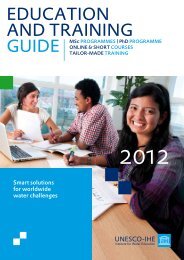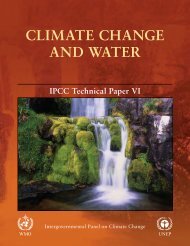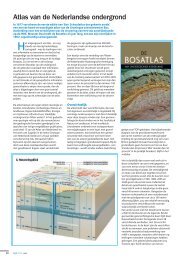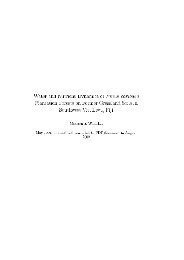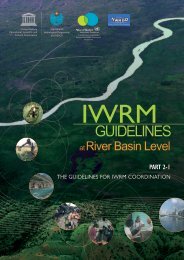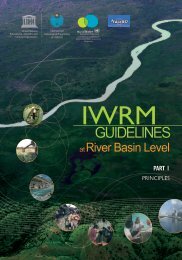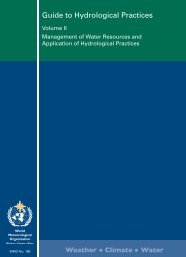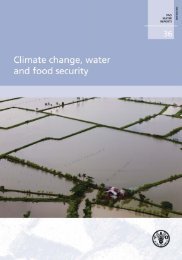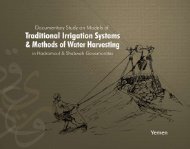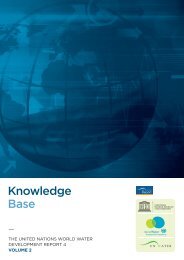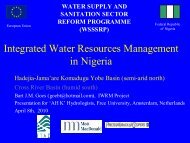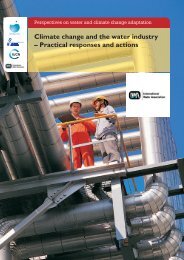NON-RENEWABLE GROUNDWATER RESOURCESTable 8. Planning scenarios and key management instrumentsSCENARIO 1: PLANNED DEPLETION(Mining of the resource)SCENARIO 2: PLANNED RECOVERY(Rationalization scenario)(a)a depletion plan including an 'exit' strategy, i.e.,an indication of what to do the day after:- resorting to alternative water sources (conventionalor non-conventional);- relocating uses and users (wherever feasible).(a)a long-term stabilization or recoveryplan containing priorities as todemands that must be satisfied firstand the uses that must be scaleddown/ banned.(b)permits containing conditions as to:- well siting;- the depth of drilling;- abstraction rates;- abstraction volumes.(c) water charges to be so structured as to (at least)contribute to the cost of implementation of the exitstrategies.(b)(c)(d)(e)Zoning, based on aquifervulnerability.Sealing of certain wells.Permits containing conditions as to(as sub scenario 1).Demand management measures.Institutional aspectsThe successful implementation of the measures outlined above requires an institutional set-upfacilitating the management of non-<strong>renewable</strong> <strong>groundwater</strong> <strong>resources</strong>. This includes:● consistent policies,● legislation,● strategic management planning,● resource administration capability at government and decentralized levels,● an informed and participating <strong>groundwater</strong> users,● capacity for monitoring and assessment.At the national levelA single authorityThe ideal solution for addressing <strong>groundwater</strong> management issues at the national level would beto place the entire range of functions relevant to <strong>groundwater</strong> in the hands of a single ministryor authority, which should also be in charge of surface water. This, however, is not alwayspossible. In spite of the existence of a ‘water <strong>resources</strong>’ institution in a number of countries,many ministries and government agencies usually have a stake and a say in <strong>groundwater</strong> developmentand use.52An interministerial coordination mechanismTherefore, legislation provides in some cases for the participation of these stakeholders in<strong>groundwater</strong> <strong>resources</strong> planning and management at the national level through interministerialcoordination mechanisms, such as a council, commission or committee. In Tunisia, for instance,a Water Council provides advice on all matters relating to policies and plans. In Algeria, a similarinstitution was created in 1996.
CHAPTER 4 ■ LEGAL AND INSTITUTIONAL CONSIDERATIONSAt the aquifer level : Aquifer Management Organisations (AMORs)The participation of stakeholders and users in <strong>groundwater</strong> management is indispensable forthe successful implementation of planning determinations and management measures. Itsimportance has been recognized, and many countries are beginning to provide, through theirlegislation, for the establishment of Aquifer Management Organizations (AMORs). AMORsare particularly useful for aquifers at risk of being degraded or ‘mined’, i.e., exploited to the pointwhere abstraction becomes economically un-attractive, whether abstraction rates exceednatural recharge, or regardless in the case of non-recharging aquifers. AMORs may comprise representativesof central government agencies, water users and other stakeholders, and of the localauthorities. They may perform an advisory role with regard to aquifer management planningand the measures required to address the negative impacts of development on the condition ofan aquifer, including measures entailing a limitation to individual water rights. Furthermore, theymay be called upon to monitor the implementation of an aquifer management plan.AMORs exist in Spain, Mexico, Australia, and western states of the USA, among others. Inparticular, a remarkable example of AMOR is offered by the Australian states sharing the GreatArtesian Basin (GAB) – Queensland, New South Wales, South Australia and Northern Territory.Each of these states has established an advisory committee for its respective portion of the GAB.The committee represents all stakeholders and provides advice to the water administration onthe granting of <strong>groundwater</strong> abstraction licenses. At the GAB level there is a GAB ConsultativeCouncil comprising representatives of the Commonwealth, the states, the users and variousassociations of stakeholders. In the year 2000, the Council adopted the GAB Strategic ManagementPlan, which sets guidelines for <strong>groundwater</strong> management at the Commonwealth andstate level. The Council is in charge of monitoring the implementation of the Plan at the basinlevel and of facilitating the exchange of information among basin states, amongst other things.Local and users’ levelFor <strong>groundwater</strong> management to be successful, it is essential, that users’ representatives participate,through their groupings or associations, in any decision that might affect their interests.This has been acknowledged by the legislation of some countries, which has provided for users’representation in AMORs. It is also important that the local authorities have a say in <strong>groundwater</strong>management when AMORs are established. Therefore, the water legislation of somecountries requires their representation in these organizations.The specific case of non-<strong>renewable</strong> <strong>groundwater</strong>Since management measures in this case are aquifer-specific, it is important to establish ordesignate an institution that will coordinate the implementation of plans and managementmeasures at the aquifer level, with the participation of <strong>groundwater</strong> users and stakeholders. Thatof the AMOR would be the most appropriate form for such an institution.International <strong>groundwater</strong> lawA number of aquifers in the world containing non-<strong>renewable</strong> <strong>groundwater</strong> are transboundary(Table 3, Chapter 1). Among these are, for example, the Nubian Sandstone Aquifer System53




